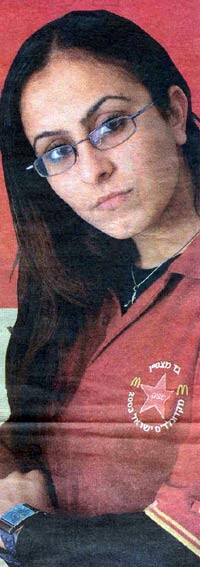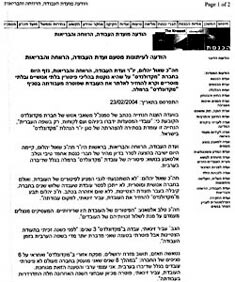The Electronic Intifada 10 March 2004

Abeer Zinaty, as pictured in Ma’ariv newspaper, wearing her “Excellent Worker 2003 — McDonalds Israel” T-shirt.
Senior McDonald’s managers, both in America and Israel, who separately responded to protests over Zinaty’s dismissal, offered starkly differing interpretations of the company’s policy on the speaking of Arabic in the workplace. And the firm’s subsequent claims - in the face of mounting bad publicity - that Zinaty was fired instead for a poor work record are apparently not supported by evidence that McDonald’s ever initiated a disciplinary procedure against her or sent her letters of warning. They also fly in the face of the company’s decision six months earlier to award her “Excellent Worker 2003”.
It has also emerged that Zinaty’s case was brought before a committee of the Israeli parliament, the Knesset, which considered whether McDonald’s had broken the country’s Equal Opportunities in Employment Law, which forbids discrimination on the basis of race or nationality. Following a special hearing on February 23, the Labour, Welfare and Health Committee concluded that McDonald’s sacking of Zinaty was “inhumane and immoral” and that she should be reinstated immediately.
So far neither McDonald’s Israel nor the McDonald’s Corporation in the US has made any contact with her.
Zinaty began work for the McDonald’s branch in Ramle, a mixed Arab and Jewish town close between Tel Aviv and Jerusalem, in April 2001 and was awarded the title “Excellent Worker” two years later, in April 2003. She was fired months later, on December 21, when she was called in on her day off to see the branch manager, Hazem Natche, an Arab from East Jerusalem.
“There had been some discussion that I was in line for promotion so when I got the call I was sure it was to offer me a more senior job in the company,” she said. “I couldn’t believe it when he said I was being fired. He told me there were several problems with my work but that the main thing was that I was talking too much Arabic.”
McDonald’s has emphasised that Natche himself is an Arab, thereby implying that his decision was not racially motivated. However, Zinaty observes that Natche - who is the regional inspector supervising six branches in Israel - had instructed workers not to speak Arabic in front of customers and refused to speak any Arabic at work himself.
“One of the topics of conversation among the Arab workers was why he always spoke Hebrew, even in private in his office. The general view was that he had received orders from head office that Arabic should be banned on the premises.”
She added: “When he fired me - even though only the two of us were in the room - he spoke the whole time in Hebrew. It was crazy: an Arab telling another Arab that she was fired in Hebrew. I was confused and so scared to reply in Arabic that I left without saying anything to him.”

Copy of the statement by McDonald’s supervisor Hazem Natche. For scans and translations of the original documents pertaining to this case, see BY TOPIC: McDonald’s Israel’s ban on Arabic.
It is also surprising that McDonalds now vehemently denies that the dismissal had anything to do with speaking Arabic when it has repeatedly stated in all correspondence that there is a ban in the workplace on Arabic, which is spoken as a first language by nearly 20 per cent of Israel’s population.
What is unclear is the extent and purpose of the ban. Julie Pottebaum, a spokeswoman for McDonald’s US head office, based in Illinois, told the Electronic Intifada on March 5 that Hebrew “is required to be spoken when on duty in order to best conduct business and best serve our customers”. This response was disturbing, given that such a policy appears to violate Israel’s Equal Opportunities in Employment Law, which outlaws discrimination on the basis of race or nationality. Arabic, along with Hebrew, is an official language of the state.
| “As far as is known, Israel is the only country in the world where McDonald’s staff are ordered to talk only one language while on duty.” |
But Pottebaum’s statement also raised the question of why Arabic is banned in the workplace in Israel when McDonald’s prides itself on promoting ethnic diversity and tolerance. As far as is known, Israel is the only country in the world where McDonald’s staff are ordered to talk only one language while on duty.
However, Pottebaum’s interpretation of McDonald’s policy, which comes in the wake of allegations by the Electronic Intifada of racism against McDonald’s Israel, is more liberal than original statements made by the company following Zinaty’s dismissal. In the first official correspondence from the company, dated January 27, Talila Yodfat, the Israeli chain’s human resources director, denies that Zinaty was fired for speaking Arabic but continues: “There is a directive known to all chain employees, that restaurant staff will speak, among themselves and with clients, only in the Hebrew language. This is in order to prevent discomfort felt by clients and staff, who mostly speak Hebrew.”
The comment that customers, including the 20 per cent who are likely to be Arabs, might be made “uncomfortable” by Arabic being spoken appears subsequently to have caused Yodfat herself some discomfort - when the statement came under scrutiny from the Knesset. In a letter dated February 23 and addressed to a lawyer for Mossawa, an Israeli Arab political lobbying group that is helping Zinaty, she retracts that part of the letter, blaming the McDonald’s lawyer who drafted it of having misquoted her.
“Since my letter dated January 27, 2004, was addressed to an attorney, I was assisted in its composition by the company’s legal consultant, advocate Ronit Tzafrir, who phrased the letter in accordance with the spirit of my words. In the gap between my spoken words and their printing, a human error occurred in the fifth paragraph. I did not notice this error before signing the letter, since what I had before me was the spirit of the letter.”
“To remove all doubt, I hereby wish to emphasize that the only language-related directive that exists in the chain refers to the professional language, which is spoken in the kitchen and in the intercom system that links the cash registers and the kitchen. It is self-evident that the employees may conduct small-talk in any language whatsoever. Our employees may speak any convenient language to the clients, and we even encourage them to do so.”
| “McDonald’s is an American company and, as in every McDonalds in the world, we all refer to the items on the menu in English. How would I say Big Mac or McNuggets in Arabic anyway?” |
Zinaty, however, has nothing but scorn for the claim that she was placing meal orders in Arabic. “I do not deny that I spoke Arabic at work to my Arab friends but never when placing orders. McDonald’s is an American company and, as in every McDonalds in the world, we all refer to the items on the menu in English. How would I say Big Mac or McNuggets in Arabic anyway?”
She points out that the company’s argument that Hebrew is needed to avoid “miscommunication” holds little water. “What Arab employee is going to speak Arabic to a Jew who knows only Hebrew? It would be self-defeating. We all know each other and know what languages each of us can speak.”
In yet another version of her dismissal, Irina Shalmor, a spokeswoman for McDonald’s Israel, told Electronic Intifada on March 7 that Zinaty was causing trouble at the branch so that she would be made redundant and could claim unemployment benefit.
“That’s nonsense,” said Zinaty. “I am studying film and television at university and desperately need money to pay my way. Now I’m unemployed and in serious financial difficulties. McDonald’s was the perfect work for me because I could choose the number of hours I worked and tailor them to my university timetable. Why would I get myself sacked when the unemployment rate here is 11 per cent and rising?”

Copy of the Knesset committee statement relating to Abeer Zinaty’s case. For scans and translations of the original documents pertaining to this case, see BY TOPIC: McDonald’s Israel’s ban on Arabic.
Shaul Yahalom, the chair of the committee, said: “I was not convinced regarding the motive for the dismissal of the employee, but in a humane and moral society it is not possible to dismiss an employee who worked for the company for three years [and] received certificates of excellence, without any written warning.”
The committee was particularly critical of the inconsistency in McDonald’s management statements. Ariella Padan, deputy to the chairman of McDonald’s Israel, told committee members that McDonald’s did not ban personal conversations between ermployees in Arabic or in any other language. But, the committee emphasised, that contradicted Yodaft’s comments. It concluded that it appeared “Abeer Zinaty was indeed fired because she breached the directives included in the letter by Ms Talila Yodfat.”
Zinaty, however, is not hopeful that she will ever be reinstated. “McDonald’s is big and wealthy enough to ignore my problems,” she said. She added that she had heard that two other McDonald’s workers in Israel had been fired for speaking Arabic but, unlike her, they were too frightened to come forward. “These sackings are working. People really are too scared to talk Arabic at work in McDonald’s.”
Jonathan Cook is a journalist whose work has appeared in the Guardian, International Herald Tribune, Al-Ahram Weekly, and other newspapers. Based in Nazareth, Cook is an occasional contributor to EI.
Related Links





